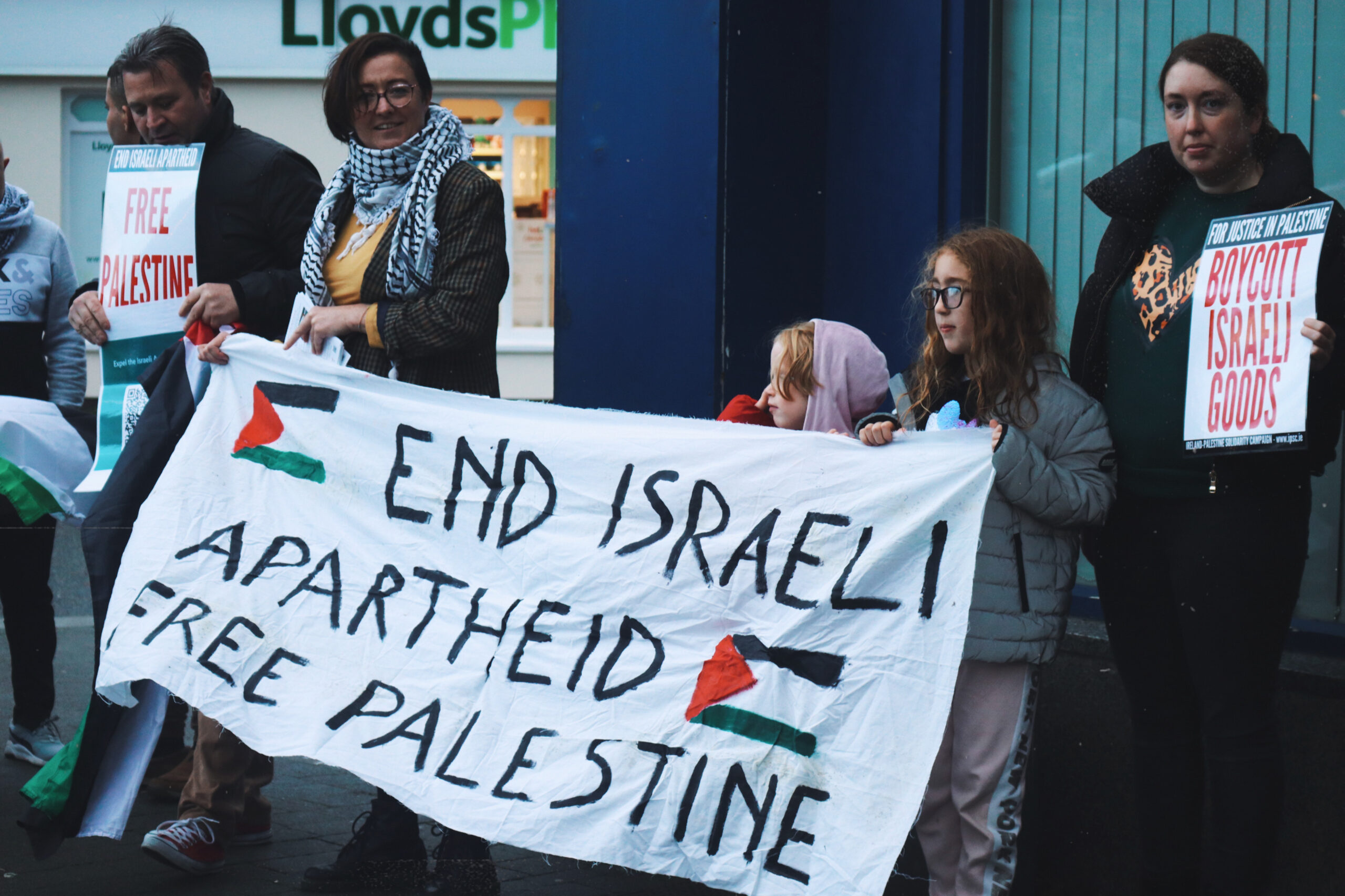At a protest held outside the Dáil on January 24, Clare Holohan, an activist with the non-governmental organization, Mothers Against Genocide, repeated a call which has become increasingly prevalent in recent months.
“Boycott, divest, and sanction Israel,” she said, “It’s the only way.”
Since the launch of heightened military operations by the Israeli Defence Forces (IDF) in response to the Hamas attacks on October 7, these three words, “boycott”, “divest”, and “sanction”, or “BDS”, have begun to seep their way further into the public discourse.
Israel’s military response, and the well-documented civilian fatalities which have ensued, have engendered several direct-action response campaigns in Ireland and across the world. The Ireland-Palestine Solidarity Campaign (IPSC) has organised protests across the country, including a march in Dublin on January 13 which drew several thousand demonstrators.
In November last year, Trinity BDS occupied Regent House, calling on Trinity to “adopt BDS principles” and to “cut ties with Israel and make a public statement denouncing Israel’s genocidal actions.” This call has thus far been ignored. If a ceasefire and accountability for Israeli leaders are the central goals of this movement, BDS has often been described as the most direct way of attaining them.
While public interest in BDS has undoubtedly increased since October 7 last year, the movement long predates Israel’s most recent campaign in Gaza. Following discussions with anti-apartheid veterans at the World Conference Against Racism held in South Africa in 2001, a network of 170 Palestinian unions, refugee networks, women’s organisations, professional associations, and popular civil resistance committees came together to call for a worldwide BDS campaign against Israel. In July 2005, this coalition established a national committee which continues to coordinate its campaigns.
From the beginning, the movement has called for an end to Israel’s occupation of Arab lands, the dismantling of the West Bank border wall, the granting of equality to Palestinian citizens in Israel and the protection of Palestinian refugees’ right to return to their homes. According to the BDS website, boycotts “involve withdrawing support from Israel’s apartheid regime” through the targeting of all “Israeli and international companies engaged in violation of Palestinian human rights.” “Divestment” involves urging investors, such as banks and universities, to withdraw investments from the State of Israel. Finally, the imposition of sanctions – the movement’s ultimate objective – would involve governments ending trade agreements and suspending Israel’s membership in international forums.
Irish involvement in this Palestinian movement is also longstanding. In 2018, Dublin City Council became the first European capital to endorse BDS and pledged to discontinue its contracts with Hewlett Packard, a tech company which provides services to the Israeli army. The Union of Students in Ireland (USI), meanwhile, voted to adopt a pro-BDS stance in April 2023.
Since the current wave of conflict began on October 7 last year, the campaign’s influence has become more and more visible. Two contenders to represent Ireland in this year’s Eurovision (eventual winner Bambie Thug and Erica-Cody) came out in favour of Israel’s removal from the contest, while five members of the Irish basketball team have reportedly chosen not to play in the upcoming game against Israel.
Perhaps most crucially at this moment, however, has been the uptake by Irish consumers. All of the protestors who spoke to Trinity News at the Dáil on Wednesday night were aware of and engaged with BDS. Crucially, the movement uses what it calls “targeted boycotts.” These involve focusing on a “smaller number” of carefully selected companies to maximise its impact, noting that many of the “prohibitively long lists” found on social media make having a meaningful impact more difficult.
Current targets of consumer boycotts include computer manufacturer Hewlett Packard, insurance company AXA and popular sports brand Puma. Tech companies such as Google and Amazon have also been identified as pressure targets. BDS also supports consumer-initiated boycotts against fast food chains such as McDonald’s and Burger King.
The need to keep action more closely targeted becomes clear in conversations with protestors. One explained to Trinity News how difficult it can be to keep up with a boycott when so many brands are owned by larger conglomerates and parent companies. This makes it easy to slip into buying from them without even noticing. The majority of protestors who spoke to Trinity News cite McDonald’s and Puma as the central targets of their boycotts, but others also mentioned Starbucks and Coca-Cola – two brands not currently on the BDS list but which have been targeted more by separate initiatives.
Crucially, the Palestinian BDS National Committee has emphasised that it “rejects, on principle, boycotts of individuals based on their opinion or identity (such as citizenship, race, gender or religion)”, meaning that it will not target Israeli businesses simply for the fact of their Israeli origins, but for their role in contributing to the injustices against which they struggle.
“Speaking with protestors, one gets the sense that these people feel they are making an impact which they would not be able to make without a campaign like BDS”
Speaking with protestors, one gets the sense that these people feel they are making an impact which they would not be able to make without a campaign like BDS. Even if many of them are unable to visibly observe the impact BDS has on events in Gaza, most can cite at least one success or another as evidence that their actions are having an impact. One such achievement could be Puma’s announcement in December, which stated that it would be terminating its sponsorship of the Israeli soccer team.
Thus, while this movement is incremental by nature, it has the enormous advantage of being both accessible and highly visible. Anybody who wants to join in can, and their impact, however small, will be felt.






